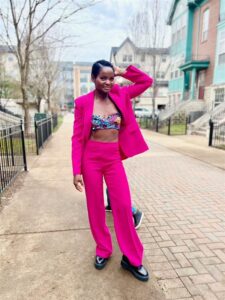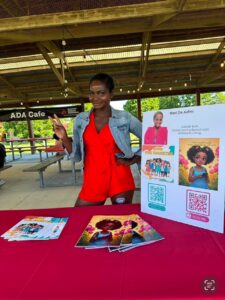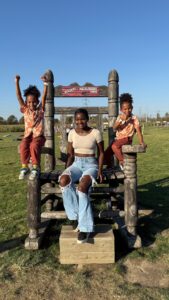
Sign up for a new account.
And get access to
The latest T1D content
Research that matters
Our daily questions
Sign up by entering your info below.
Reset Your Password
Don't worry.
We will email you instructions to reset your
password.
Safiyah Basir was diagnosed with type 1 diabetes (T1D) as a young child. Her positive mindset and healthy lifestyle have laid a solid foundation for her overall well-being with T1D. Now, Basir is focused on sharing what she’s learned with others. She explains, “How can I help the T1D community? That’s where my mindset is at — where it’s pretty much always at.” 
“T1D can be difficult at times, but it doesn’t always have to be terrible,” said Basir. “Having a different mindset is important — to be in a place where you can feel good, be good, and live healthier.”
T1D Exchange recently sat down with Basir. We talked about her twin pregnancy, healthy initiatives, and her experience as a Black person who lives with T1D — as an advocate, author, podcast host, mom, and the queen of diabetes positivity.
Can you share your diagnosis story?
Safiyah: I was diagnosed at age seven. I just remember going to the hospital and them telling me, “You need a shot to eat these chips.” They were trying to teach my mom how to give me a shot, and she couldn’t do it, so I took the needle from her and said, “It’s OK, Mommy. I’ll do it.” And BOOP — I gave myself the shot!
I don’t remember a ton of my childhood, but I do remember that vividly because it was such a pivotal point in my life — like my health, next steps, and literally surviving, you know?
My mom’s dedication came from a deeply personal place, as her mom passed away from complications of type 1 when she was 29. That’s why it was so difficult for her to give me my first shot.
What was behind your drive to author T1D children’s books?
I was teased terribly in elementary school. After I was diagnosed, kids would say, “Don’t play with Safiyah. Don’t touch Safiyah. You’ll get diabetes.” And that’s why I wrote the children’s books — just to create more awareness.
While I have four siblings who looked out for me, especially when they noticed I was being bullied, I didn’t want anyone to have to go through that experience. It was very difficult growing up with diabetes and being the only one because I didn’t know anyone else who had it. 
When I was diagnosed, there weren’t any books about type 1 diabetes — let alone any books with representation — or books with positivity like “I am beautiful, I am powerful.” My books “I Will Take Care of My Diabetes and I Can” and “ABCs for Diabetes” are helping to share this message. There are still so few T1D books available.
Recently, a mom sent me a picture of her little girl, Omni, who has type 1 and was holding my book. She was smiling, not letting it go, and taking it to preschool. Her mom told me she would not put it down. It was so sweet.
What has your adult life been like with T1D?
After high school, I started working and moved to New York. There was one day that I wasn’t feeling well, and I was like, “This is my diabetes, and I have control over it.” So, about 15 years ago, I shifted everything.
These were important changes for me. I’ve had diabetes for a hot second—it’s been 30 years now. I started participating in diabetes groups, taking online courses, and figuring out how to eat better and take better care of myself. I discovered more plant-based eating, which I do about 80% of the time.
My blood sugar has been thanking me for it because it’s less fat and insulin resistance. Within that time frame, my A1C has been between 5.5 and 5.8. Right now, it’s 5.6, and I’m just so proud of that.
How do you maintain your diabetes positivity?
I started the Diabetic Loving Podcast because I had been seeing a lot of stuff online about how diabetes sucks and people hate it — you know, “this and that.”
In the past, I read something from a cancer survivor. She basically said that “she loved her cancer” because she was able to take way better care of things that she loved than hated.
And I just thought that was for me. It was mind-blowing, right? Because if you say you hate something, you’re just going to be mean to it, and it’s kind of going to hate you right back.
I start every day with this positive affirmation: “I’m ready for all the blessings, miracles, and abundance that are waiting for me. Today, I’m open, I’m ready, and I receive.”
I’m actually writing two 365-day affirmation books for kids and adults with diabetes. One affirmation is: “I’m safe in my body,” because sometimes, diabetes can make you feel like you’re not.
What has your experience been as a person of color with T1D?
As a black woman, a black person with diabetes, I’ve had a mixed experience. My first pediatric endocrinologist was an African American woman, and I could see myself in her. She listened to what my mother and I were saying. I felt heard.
Later, as an adult, I went to an endocrinologist who really didn’t listen to me. I’m a smaller person, and he just gave me a standard amount of 24-hour insulin, and it almost killed me every single night.
He really didn’t listen to my questions, see me for who I was as a person, or think through the effects this dosing would have on me. I had to wake up each night and chug juice, and I just believed the doctor, right?
My endocrinologist is now an Asian woman, and every time we talk; she says: “Tell me what’s really going on.” And I do.
Whenever I see something new, I ask about it. If I think it’s going to be beneficial, I’m going to always ask for it. I’m in many chat groups with Black women, and I’m aware of others’ experiences, but I personally haven’t had that rough of a time with asking for something and receiving it. I’m one of the fortunate ones.
I’ve had an insulin pump during my whole pregnancy and started on a CGM after my boys were born. I don’t get pushback for what I’m asking for. If my insurance is paying for it or I can pay for it, there’s no reason why I shouldn’t be allowed it.
How did you become involved in mentoring people of color living with T1D?
I worked with Wayne Pediatrics in the Detroit area. They inform their clientele about how to approach their doctors and what to ask for. I helped promote their events so people knew what was available to them, including an early screening program.
When I was there, a woman who has a son with T1D didn’t know there was financial assistance for diabetes camp — so her son wasn’t going. It’s just figuring out ways to spread the word because, often, with diabetes, you feel like you’re alone, right?
I have a decent following on Instagram, so I do my best to let folks know what’s going on. I post my blood sugar every day, and it’s usually just a straight line so anyone can see it’s possible for them.
I haven’t tested my boys. I’m a little nervous, to be honest. I love the science, but to be point blank, I’m human, and I’m nervous. The scientific part of me knows that I will, but the mom part of me is saying, “Just give me a second,” you know?
I also worked with the Kyler Cares Foundation. They’re based out of New Orleans and are a type 1 and type 2 diabetes foundation for black and brown people, where they promote screening, care, and community.
I was able to go down to New Orleans, and many folks there didn’t even know about camps. So, I’m like, “What, you don’t know about diabetes camp?”
My mother played a huge role in ensuring I had everything I needed growing up with diabetes. She discovered Camp Midicha and made sure I could go. At camp, I not only won Janet Jackson tickets, but I realized I wasn’t alone with type 1 diabetes.
That’s why I’m trying to let more people know about these opportunities — scream it further and wider — so more people can find out. There’s not a hub where everything’s available for folks to know and be able to tap into. And, yes, of course, this lack of information is exaggerated for people of color.
What do you educate about and advocate for?
I advocate for taking ownership of your body’s nutritional health, reading labels, and making sure you know what you’re eating, because that directly affects blood sugars, right?
So, eating well, in general — and being in tune with your body — is a huge blessing that comes with having T1D.
Having a positive mindset about it all, but not toxic positivity. Realizing I’m having a crappy time right now, but it’s absolutely temporary, right? I’ve found a lot of times people just get stuck.
So, the mindset is taking action and owning your being and body. And then, community is huge — just being there for each other.
Honestly, there needs to just be a checklist for every single diabetic. “Did we talk about this or that?” Like, “check, check, check. OK.”
Then, people can say “yes or no” without others making choices for them. Giving people the options and the necessary education helps them to understand their choices. Sometimes, people just need to know how to get started. Someone may be happy with shots but don’t know about the alternatives. Diabetes tools can make a big difference, and we can’t assume people may not want them. No one should be left behind or left out, right?
What was it like having a twin pregnancy?
All of it was a surprise: the pregnancy and having twins. We don’t have twins in our direct families. I had a great pregnancy (except for them taking all my iron). I was legitimately craving red clay because of it — I’m like this sounds delicious — I was the craziest person, haha. Like, “Where is the clay?”
I was in the doctor’s office like twice a week getting ultrasounds, making sure everything was fine and was considered a high-risk pregnancy. There was so much going on.
 I had one incredibly scary experience because they were taking so much sugar from me. I fell asleep, and my blood sugar was so low I couldn’t move. I had to hype myself up to call 911. The fire department came and gave me glucagon.
I had one incredibly scary experience because they were taking so much sugar from me. I fell asleep, and my blood sugar was so low I couldn’t move. I had to hype myself up to call 911. The fire department came and gave me glucagon.
Later, we went back to the fire department for tours of the fire trucks and everything. And I said, “I have so much gratitude for you guys. You literally saved three heartbeats. And one of the firefighters said, “I thought you looked familiar. That was me!”
I was so grateful, he saved our lives, but that was the only really tough thing. I ended up having an emergency C-section at 36 weeks because of their heartbeats, but they were perfectly healthy. I had a beautiful pregnancy.
What’s next for you?
Going to PA school is a goal that I’m working towards. First, I’m getting my bachelor’s and then my master’s degree. My father passed away from type 2 diabetes a little over two years ago and has made this journey even more meaningful for me. I’ve been on the Dean’s list every semester, so that’s good!
Do you want to be notified about diabetes research opportunities? Join the T1D Exchange Registry by filling out a short online survey about everyday life with T1D. Once enrolled, we will let you know about other T1D research opportunities like surveys, focus groups, and clinical trials.







